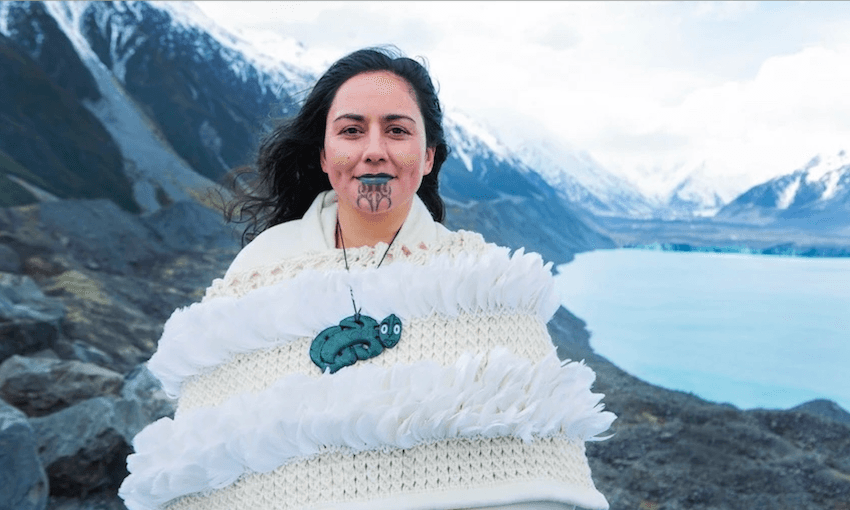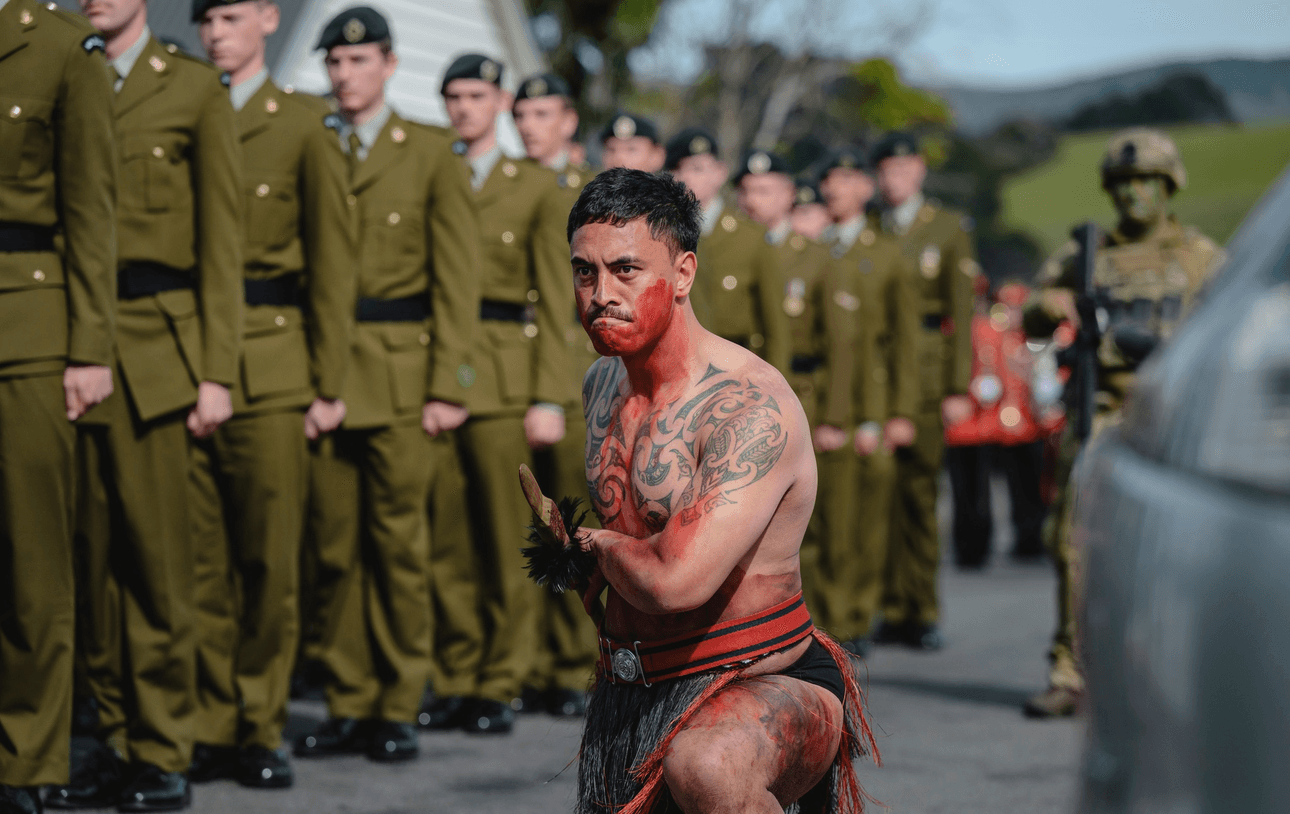Ariana Stevens founded Reo Māori Mai in 2018 to help people connect with te ao Māori through the reo. On Friday she was awarded Tū Rangatira, the supreme award at the Ngā Tohu Reo Māori awards.
Te Tai Poutini (the South Island’s West Coast) is often characterised by its remote location and beautiful, varied landscapes. Poutini Ngāi Tahu call this area home, and it is also the remote home of an organisation that’s shaking up how businesses and schools are connecting with te ao Māori.
Ariana Stevens (Ngāti Waewae) is the founder and CEO of Reo Māori Mai, a company that provides classes and workshops about te reo and te ao Māori for businesses and organisations in Ōtautahi/Waitaha and Te Tai Poutini. She has spent around six years embedding her kaupapa into Te Tai Poutini communities, the same communities her whānau hails from – though growing up, Stevens certainly wasn’t as connected to her taha Māori as she is now.
Stevens grew up not knowing her reo, intentionally distancing herself from this part of her identity throughout school. Winning awards for Māori student achievement during her time at Nelson College for Girls was “awkward” for her, because, she says, she “didn’t actually want to be Māori.”
After high school, Stevens’ decision to study in a Māori immersion course at the Nelson Polytech wasn’t a symbolic gesture that this perspective had changed, she says. It was a way to “tread water for a year” so that she would be 18 when she started university.
“It also helped that the person who my mum had been learning te reo Māori with over the years was running this full time immersion Māori language course at Nelson Polytech for a year. So it was an opportunity to be around someone that I knew after my parents had headed south, and I just happened to learn te reo Māori on the side.”
At the end of that year, having learnt her reo, Stevens still felt disconnected from her taha Māori. She left Nelson to get a law degree, during which time her two tamariki were born. It was soon after the birth of her second child in 2009 that Stevens recalls hearing another mum speaking to her tamariki only in te reo Māori.
“It was the first time that I had ever seen someone only speaking te reo Māori to tamariki, and seen that te reo could be a language of everyday communication,” she says.
While it had been a few years since completing the immersion course in Nelson, Stevens still knew her reo, and decided it was time to share this knowledge with her tamariki.
“I jumped in boots and all into speaking te reo Māori with Kōmai, who’s now 14 and a half. That was the catalyst for connecting to our iwi and connecting to myself as Māori.”
Since then, those connections have only grown stronger, and led Stevens down a pathway that her high-school self could have never imagined. Standing strong in her Māoritanga, she is now sharing her knowledge with more than just her tamariki; with entire communities wanting to do the best they can as and by Māori.
Reo Māori Mai was born in 2018 from a personal desire of Stevens’ to work between Te Tai Poutini and Ōtautahi. “There wasn’t a job that existed,” she says, so she created one. It was an early iteration of the work she does now – but 18 months into working as a sole trader, Stevens wanted some support, and to create a business that formalised the work she was doing under a company name different from her own.
“Initially, Reo Māori Mai was contracts running professional development for organisations mainly around te reo. I can’t pinpoint exactly when, but at some point, just teaching te reo started to feel like it was missing something. So I started adding in what I now call context conversations about Te Tiriti, colonisation, racism and more, in the hope that as people are learning the reo, they also have a bigger context for it to sit within.”
Now, Reo Māori Mai works with all the schools on Te Tai Poutini, as well as businesses and organisations both on Te Tai Poutini and in Ōtautahi/Waitaha, running workshops on te reo Māori and all the context conversations that frame it.
In schools, the Reo Māori Mai kaupapa includes “talking to teachers about how to respond to racism, talking to them about our understanding and perspective around Te Tiriti o Waitangi, and some of the current political rhetoric and how they might see that show up in their classrooms and communities”.
It’s important, says Stevens, to not only teach te reo, but to show that there is much more to being Māori, and much more to being a good haumi/ally than knowing the reo.
Stevens says she’s always careful not to use her te reo knowledge to exclude or “hold a position of importance” over those who aren’t so far along their journey. “If I, as a reo speaking Māori person, learn that another Māori person doesn’t know their pepeha or a karakia or any reo at all, and I respond to that with surprise or sarcasm or anything other than compassion, that’s a symptom that I have more internal work to do,” she says.
The explosion of interest in kura pō, reo Māori night classes, throughout the country has been discussed as a positive step for the reclamation of the language. However for many Māori people, these classes can be a confronting space. Especially when filled with non-Māori who aren’t always aware of the stark difference between their language learning journey and that of a tangata Māori.
“It’s not always just a fun evening activity for a Maori person. It’s the reclamation of intergenerational knowledge that was taken. It wasn’t lost, we know exactly where it went and why it went there. It was taken,” says Stevens.
She encourages non-Māori to learn about how best they can help the Māori people in their lives to seek the learning, time and resources that they need to reclaim the reo of their ancestors. Non-Māori taking actions like giving up their spot in a reo Māori course for a Māori person, or ensuring they are not dominating Māori spaces with often well-intentioned, but misplaced dialogue, can have a huge positive impact.
“I also think it’s really important that there are spaces that are just for Māori to be able to have conversations about our experiences of reclaiming our reo. I don’t think we should always have to navigate non-Māori sensitivities around those conversations,” says Stevens.
Reo Māori Mai also has a large following on social media – over 14 thousand on Instagram alone – which Stevens said has skyrocketed over the last few years. For her, it’s not a huge part of the business strategy, just somewhere she and the team can share what they’re up to, alongside short lessons on te reo Māori basics and that all important context.
“The content used to happen when I was sitting in my lounge, having a cup of tea. I would have a thought and it would just really easily become a social media post. There’s no real strategy. It’s about what I see happening in the world.”
Most recently, that has meant a post about the Hector’s dolphin, calling out an unnamed CEO for rallying against conservation efforts in order to prioritise a sporting event, and a nod to the “tangiweto” painting over rainbow crossings.
The Instagram page is also a helpful resource for those wanting to keep up their reo learning – the posts providing not only kupu to learn, but the reasonings for certain grammar rules that exist in te reo Māori, or explanations for using certain kupu over others.
View this post on Instagram
Winning the Tū Rangatira Award wasn’t on the radar for 2024 for Stevens. She still sees the business as an “unfinished project”.
“My previous experience of this kind of celebration is: you do a degree, you get your degree, you celebrate, you do the next thing, you finish the thing, you celebrate. The mahi on Te Tai Poutini feels very much early stages, ongoing and intergenerational,” says Stevens.
She acknowledges all the mahi of the people who have helped her and her pakihi grow over the years – from those looking after her tamariki or catching her worries, to those who have been alongside in the mahi, and says it’s a good time to reflect on the progress Reo Māori Mai has made so far.
“I remember when Vicci and I were at a market in Wellington selling some of the products that we make, and we watched our Instagram followers tick over to 1,000. We were like, ‘Oh, that’s so cool’.”
Now, just a few years later, and with countless organisations, businesses and schools enlisting the Reo Māori Mai team to help them better connect with te ao Māori, the successes are stacking up. But Stevens’ goal remains simple, in theory: to play a part in steering Aotearoa towards becoming a healthy bicultural nation and multicultural society, where te reo Māori thrives.
“I hope that what I’m doing is helpful for my tamariki and my mokopuna to get to start from a different place than I started from. Much like my mum and taua did… that over generations, we just keep moving the starting posts. I think I’ve been helpful. And that’s kind of the aim.”


